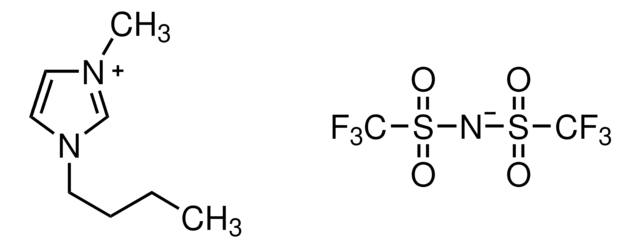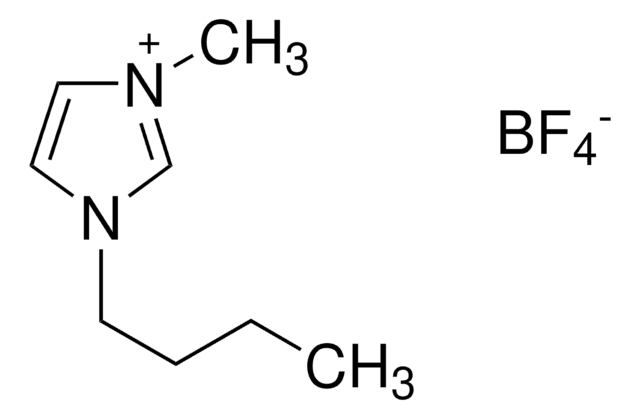おすすめの製品
品質水準
アッセイ
≥99%
フォーム
liquid
組成
H2O, <500 ppm
不純物
≤500 ppm H2O
mp
1 °C
密度
1.454 g/cm3
アプリケーション
battery manufacturing
SMILES記法
CCCCn1cc[n+](C)c1.FC(F)(F)S(=O)(=O)[N-]S(=O)(=O)C(F)(F)F
InChI
1S/C8H15N2.C2F6NO4S2/c1-3-4-5-10-7-6-9(2)8-10;3-1(4,5)14(10,11)9-15(12,13)2(6,7)8/h6-8H,3-5H2,1-2H3;/q+1;-1
InChI Key
INDFXCHYORWHLQ-UHFFFAOYSA-N
類似した製品をお探しですか? 訪問 製品比較ガイド
詳細
アプリケーション
関連製品
シグナルワード
Danger
危険有害性情報
危険有害性の分類
Acute Tox. 3 Dermal - Acute Tox. 3 Oral - Aquatic Chronic 2 - Skin Corr. 1B - STOT RE 2 Oral
ターゲットの組織
Nervous system
保管分類コード
6.1C - Combustible acute toxic Cat.3 / toxic compounds or compounds which causing chronic effects
WGK
WGK 2
引火点(°F)
Not applicable
引火点(℃)
Not applicable
この製品を見ている人はこちらもチェック
資料
固体電池は近年高い関心を集めており、固体Li、NaおよびAl電池の最近の進展や問題点について解説いただきました。
Solid-state Li batteries: Review of solid electrolytes, ion conduction, structures, and electrochemical processes.
イオン液体は電気化学的に安定な広い電位窓をもち、難燃性と比較的高い導電性をもちます。そのため、アルミニウム電池や不燃性のリチウムベース電池、デュアルグラファイト電池の有望な電解質とされています。
Ionic liquid electrolytes explored for rechargeable batteries' advancement; future IL development discussed.
ライフサイエンス、有機合成、材料科学、クロマトグラフィー、分析など、あらゆる分野の研究に経験のあるメンバーがおります。.
製品に関するお問い合わせはこちら(テクニカルサービス)













